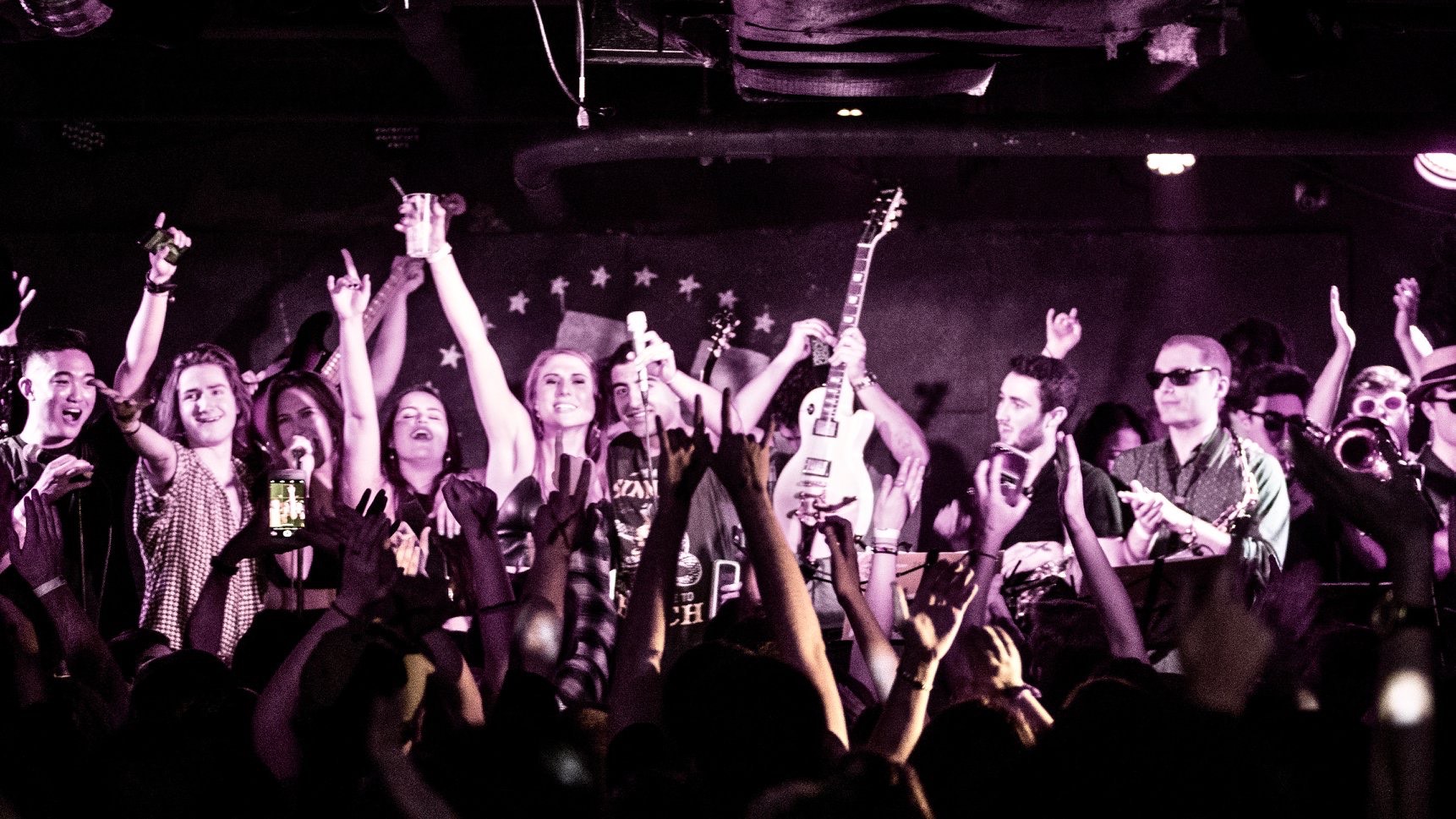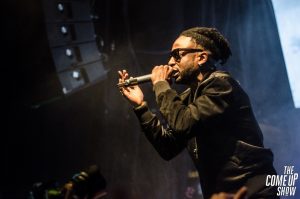Cabaret is, quite literally, an intergenerational Georgetown tradition. When Teddy Zambetti (COL ’80) helped put on the original Cabaret in 1977, he had no way of knowing that his daughter Sofia Zambetti (COL ’22) would be performing at the annual rock extravaganza 43 years later.
“I’m just amazed that something that we started in the ’70s is still going on today,” he said.
This Thursday, some of the most talented members of the Georgetown student music scene will take the stage at U Street Music Hall to perform a nearly three-hour long rock concert. With a vast repertoire of covers—ranging in genre, era, and instrumentation—Georgetown Cabaret aims to create a captivating experience for performers and audience members alike.
“[It’s] something put on by musicians and vocalists on campus who wanted a little something more,” Alexandra Schlesinger (COL ’20), one of Cabaret’s general managers said. “There has always been a bit of a void on campus for creation and creativity and performance opportunities.” Cabaret defines itself by its commitment to student leadership—everyone, from the performers, to the general managers, to the revenue bookers are students.
In addition to collaborating with a venue and various advertisers, like The Corp, Cabaret also partners with a charity for every show. This year, Cabaret is continuing its recent partnership with Relay for Life, donating the vast majority of their profits to the organization.
Contrary to a cabaret style of show, which is composed of several separate acts, Cabaret features a cohesive concert from a core group of musicians. In addition to two guitars, a drummer, bassist, and keyboard player, about half of the songs incorporate brass instruments.
While the band stays on stage the whole show, singers change out regularly. New vocalists perform two songs with the band, while returning singers perform three. This vast array of styles allows for the band to employ wide variation in its song selection. This year, audience members at U Street will be treated to performances ranging from “Somebody to Love” by Queen to “No Role Modelz” by J. Cole to “Freak the Freak Out” from Victorious to a Lizzo medley.
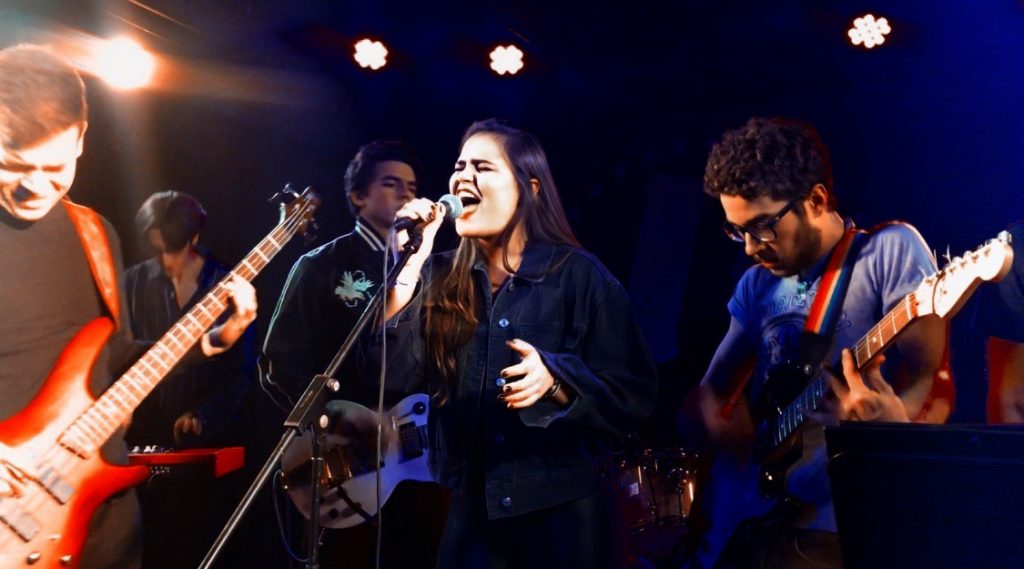 Courtesy of Georgetown Cabaret
Courtesy of Georgetown Cabaret
General manager James Khoury (SFS ’20) acknowledges that, for what is essentially a rock concert, “Cabaret” can seem like a misnomer. But the event has not always existed in its current form. The concert finds its origins in a 1976 all-freshman talent show put on in Darnall Hall. The next year, in an effort to continue and grow this tradition, students moved the show to Copley Formal Lounge and opened performance slots to all grades.
Teddy had thrown out the name “Cabaret” while brainstorming for the event his freshman year which, at the time, featured comedians and magicians as well as musicians. “And I still to this day remember [thinking], ‘No, no, no, I hate the name. That’s just a starting point,’” he said. “But it stuck.”
Teddy’s older brother had attended Georgetown in the ’60s, and on visits Teddy witnessed what he perceived to be a vibrant music scene. Ten years later, Teddy was eager to arrive on the Hilltop and make music a defining part of his college experience. However, the scene of the ’60s seemed to have vanished. “[I] got there and there was nothing,” he said. “It was so different. There was Mask and Bauble and the Chimes and that was it.”
He met Gary Kearns (SFS ’79), a talented pianist and one of the organizers of the Darnall show, and began to work with him on a second event in Copley Formal. “When we first started this, it was really just to play,” Teddy said. “But I think it was to fulfill a need—a void. There was nothing like that that the university was offering.”
“He wanted to create a place where musicians could have the ability to stay in contact with each other and just connect with each other,” Sofia said. “[He was] really creating a safe haven for creatively minded people.”
Students have organized annual Cabarets every year spanning four decades. As the tradition became more established, the show moved to professional venues off campus and honed in on its concert-like nature.
Though the location and substance may have changed, Cabaret has never wavered in its goal to invigorate Georgetown’s student music scene. “It’s a really great chance for Georgetown students to perform in a professional music venue with professional sound,” Khoury said.
“[The work that we’re doing] is something that no other group on campus is able to do, which is pretty phenomenal,” Schlesinger added.
Cabaret gives student musicians the chance to showcase their work in a space dedicated to the D.C. music scene, as the show partners with venues like U Street Music Hall and previously the Black Cat. This provides a unique opportunity for the event’s organizers, as well as its performers. Because the show is not, and has never been, officially affiliated with the university, Cabaret’s general managers must work out the planning, logistics, marketing, and financing of the event from start to finish.
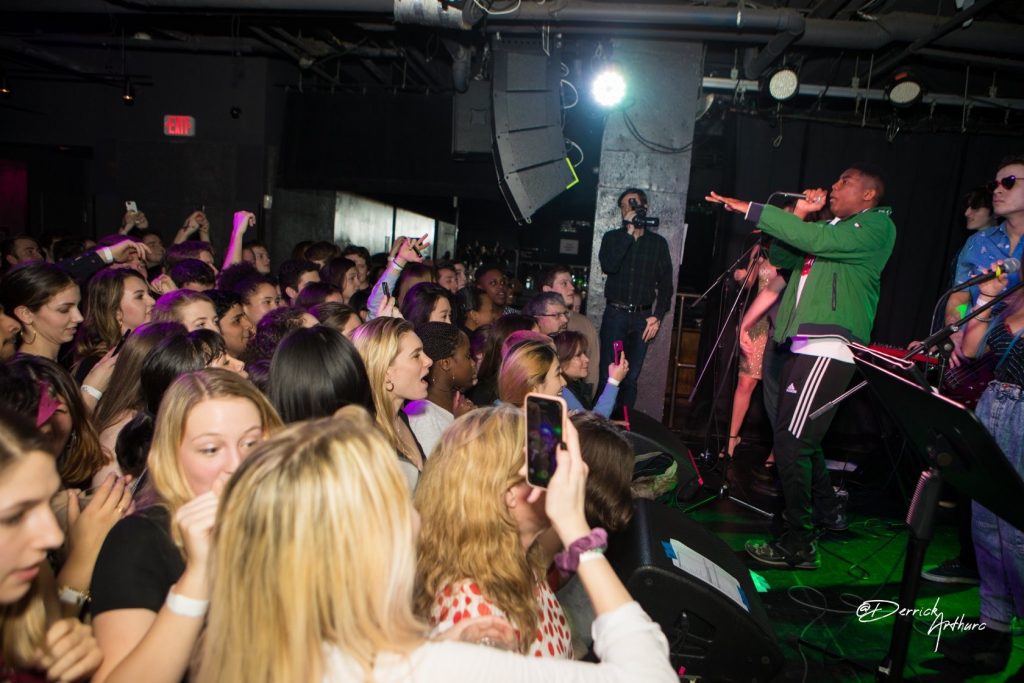 Courtesy of Georgetown Cabaret
Courtesy of Georgetown Cabaret
This gives students valuable experience, according to Schlesinger. “[In] other music groups and singing groups on campus, you have to report to [the Department of Performing Arts], you have performances that are all run by DPA,” she said. “You’re not really involved in a lot of the negotiating with the venue or just kind of the things that are very real things that you have to do if you want to take music seriously for the rest of your life.”
While the band now has weekly rehearsals in New North’s Studio A, this is a relatively recent development. “As a freshman, I came to Cabaret rehearsal and it was in someone’s Burleith basement,” Khoury said. “I was playing trombone and they had nothing written out.”
After that, Khoury formalized the process. He began writing the sheet music for all of the brass and woodwind arrangements and streamlined the song selection. The ensemble chooses which songs it will perform based on five preferences from each singer and five preferences from the band, all organized over Google Sheets. Every member of the band considers how a singer’s voice would work with certain songs, such as reserving raspy intonations for Amy Winehouse, and powerhouse vocals for Freddie Mercury.
“I think we have a lot of really interesting female vocalists this year in a way that we maybe haven’t had in the past,” Schlesinger said, noting how she is particularly excited for some of the female rappers who will perform this year. “Whereas like years ago I would say everybody sounded just like rock singers. We don’t have that anymore. Every song sounds super different.”
While arranging every number would already be an impressive task, the fact that the songs represent vastly different styles and genres leaves Khoury and the other student musicians with many choices to make regarding specific instrumentation. Some songs, like Cascada’s “Everytime We Touch,” utilize the band’s vibrant brass section—including multiples saxophones and a trombone—to create driving, dynamic melodies.
Other songs experiment with vocalization. In “Ain’t It Fun” by Paramore, members of the a capella group the Georgetown Phantoms back a soloist for a rich and powerful vocal effect. “It’s exciting to see more musicians come out for some songs and it adds that flavor to some of the pieces,” Khoury said.
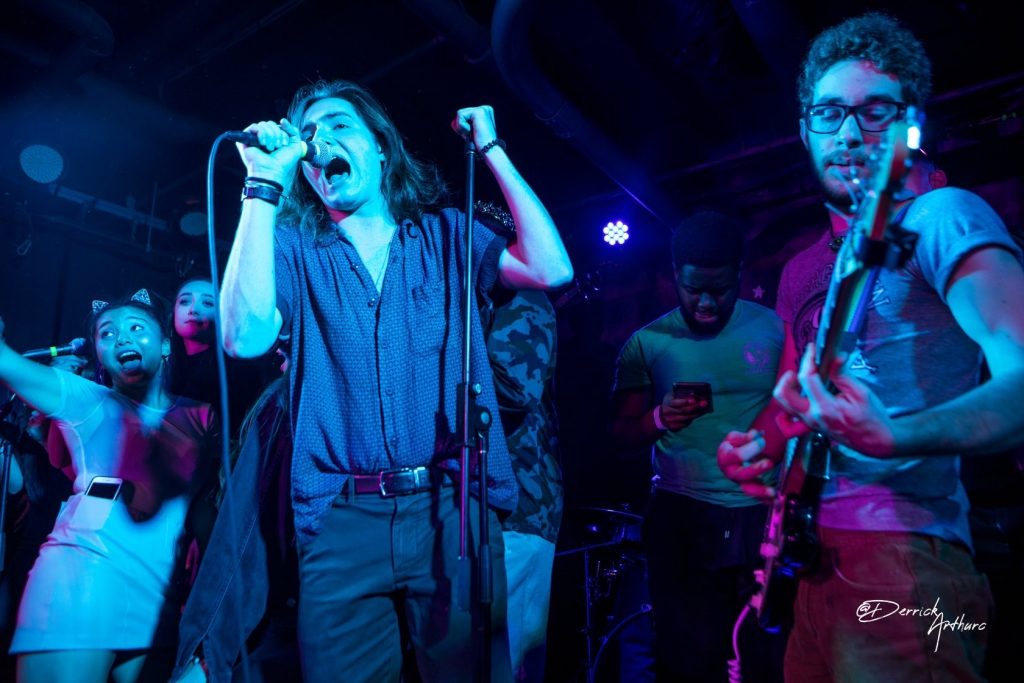 Courtesy of Georgetown Cabaret
Courtesy of Georgetown Cabaret
While many of the band’s members come from existing musical ensembles on campus, like a capella groups, the pep band, and jazz band, this involvement is not a prerequisite for performing in Cabaret. “They may not be, you know, the most musical, they may have no musical background at all, but if they’re a good performer and they are fun to watch and engaging,” Schlesinger said, “we’ll take them.”
Each singer and instrumentalist, no matter the difficulty of the notes or the size of their instrument, clearly plays to perform. Even within the casual environment of Studio A, the student musicians’ stage presence is undeniable.
“Throughout the audition process it’s one thing to come out and sing for us, but it’s another thing to come out and perform, and we’re looking for people who can handle a performance on stage,” Schlesinger said.
This year’s general managers hope that Cabaret will continue to expand to include more members who may not be involved in other aspects of the university’s music scene. “There are many kids on campus who play instruments that are very talented and sing, and they might not know about [Cabaret] because they don’t necessarily work through those circles on campus,” Khoury said. “The strategy is to really let people know what it is without going into, ‘Well, it’s not really the play Cabaret and it’s not a real cabaret show.’”
Cabaret’s impact does not stop after one lively night in February. For Teddy, the show was just the beginning of his musical career. He is currently the in-house composer at Sirius XM Radio, and has consistently worked in the music industry since the mid-1980s, following his graduation from Georgetown. Teddy eventually decided to use this experience to further enhance the university’s student music scene as an alumnus. In 2006, in conjunction with the Georgetown Entertainment and Media Alliance (GEMA), he formed GEMA Rocks, an event that showcases both undergraduate and alumni musicians from the university and has even featured comedians in the past—similar to the original Cabaret.
Teddy has also inspired musicality in Sofia, who will be playing the flute in the band’s Lizzo medley. Sofia grew up playing music with her parents and sister, and Cabaret has helped Sofia find her own home on the Hilltop. “Having that extension of my family life here, it’s just…amazing,” she said. “You kind of lose yourself when you play—even though it’s the flute.”
Teddy has not been to a Cabaret since 1980, when he performed for the last time as a Georgetown student. But he will be at U Street on Thursday to support Sofia, and of course, enjoy the show.


